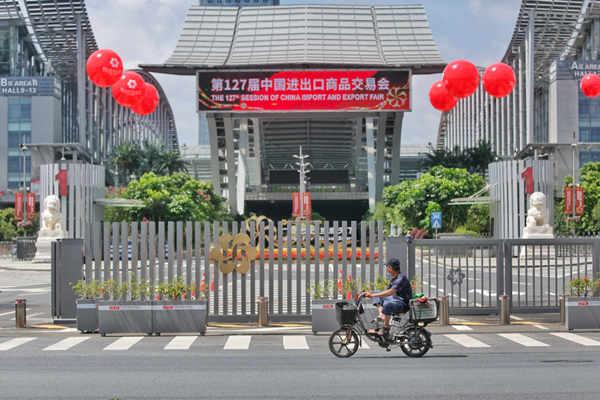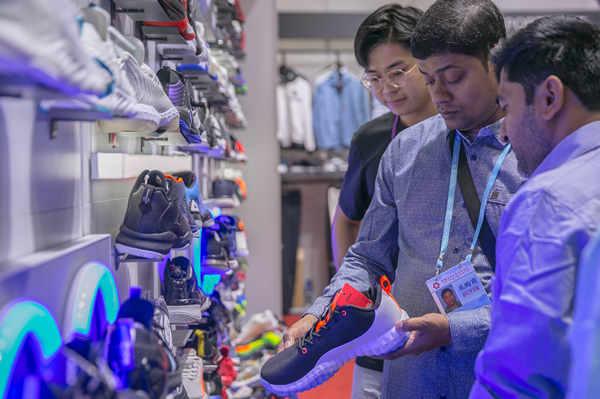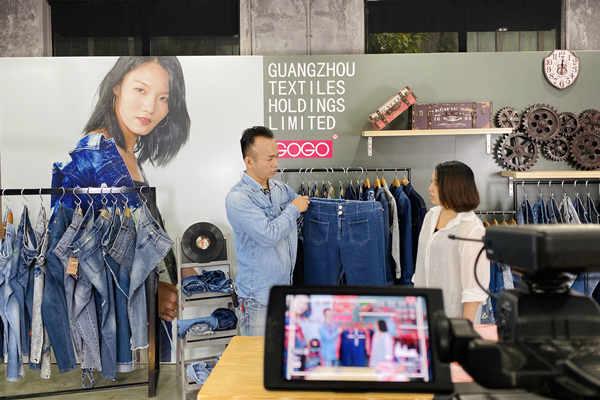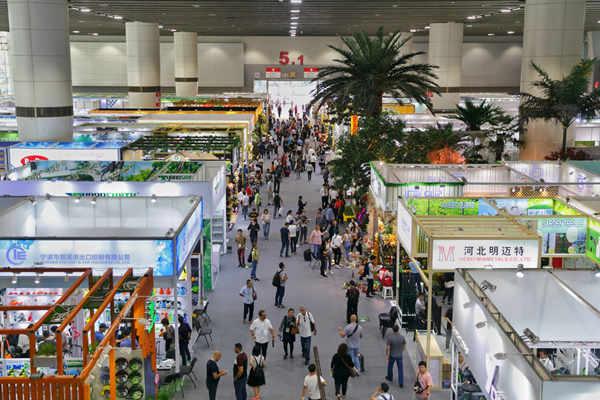
Photo: Nanfang Daily
Tens of thousands kilometers away from China, Fabien Dessaint, a French businessman was on business trip in the Caribbean Region. Sitting in his room with a cup of coffee, he was browsing products and communicating with exhibitors in Canton Fair - the oldest, largest, and the most representative trade fair in China - just with a laptop.
The 129th China Import and Export Fair, also known as the Canton Fair, started on April 15 and just concluded on April 24. It is the third time the fair has been held online due to the coronavirus outbreak.
“After the online Canton Fair in June last year, I placed orders in August, September and October, mainly for furniture, toys and electric products. I ordered 7 containers respectively in September and October," said Dessaint, "Although we had to postpone our events in China, we still had an increase in turnover thanks to the importation of goods. I think it's important to have an online Canton Fair, because it allows everyone to take advantage of the digital world.”
Is the Digital Age of exhibition coming? What are the new trends of the exhibition industry? How will global supply chains change in the post-pandemic era? What does it mean for global trade once RCEP trade deal was signed?
Canton Fair could be an indicator for China’s ‘dual circulation’ strategy and global trade in the post-pandemic era.

Photo: Nanfang Daily
How the exhibition industry is trending?
Instead of hundreds of thousands of buyers from around the globe descending on Guangzhou, the Canton Fair on Cloud sees no hustle and bustle, about 26,000 domestic and international enterprises displaying and browsing through over 2.7 million exhibits in cyberspace. Some opinions are skeptical about this new pattern of B2B exhibitions.
According to the “UFI Global Exhibition Barometer” survey released in January, 2021, only a minority of 14% respondents agree with “Virtual events replacing physical events” while 64% agree that “COVID-19 confirms the value of face-to-face events”.
Giselle Bonet, Director at Pinchili China Service Limited, comes from Venezuela. Having joined every session of the Canton Fair since 2014, her company is dedicated to connecting costumers from North and South America with the Chinese market by providing brokerage, warehousing and shipping services.
“Canton Fair is the biggest opportunity to see so many suppliers together with very good products. And it’s much easier to compare prices, qualities, all of them in one place”, said Bonet.
To prepare for the 129th Canton Fair, she and her team worked day and night to collect information of exhibitors and catalogues from the suppliers online.
“You’d better have the specifications of the products, knowing what you want exactly. For instance, if you want to buy shoes or a table, you need to know the material, the size, all of the information as much as possible to help suppliers to give you the real price, which can save you a lot of time.”
Ding Yanggang is the Director Manager of Sanjing Trade Company in Malaysia. He’s an ‘old friend’ of the Canton Fair as he accompanied with his father to participate in his first Fair in 1990, at age 18.
“My father went to the Canton Fair for the first time in 1986. At that time, he got in touch with his first suppliers from the Canton Fair, some of whom we have been cooperating until now.” In Ding’s opinion, the Canton Fair is where he can build and expand his social network, which is essential for his trade industry. “This is the feature of the Canton Fair. It attracts traders from around the world so you can always meet new friends and make new business.”
In 2020, Ding also attended the two online sessions of the Fair.
“The online exhibition is totally a new mode”, said Ding. “Last year, our company cooperated with a lighter supplier in China to customize a new style of product for the Southeast Asian market. You must make it more precisely and always focus on details.”
Standing with colorful clothes in his hands, a salesman of Guangdong Textiles Imp. & Exp. Co., Ltd (GDTEX) is promoting products on the 129th Canton Fair’s website. It is the third time for the company to participate in the online trade fair.
“The Canton Fairs online bring us great opportunities to rethink and reshape our business. The e-commerce platform can help us collect data of the marketing activities of buyers such as product preferences, their active time of trading and so on. It lays a foundation for us and leads to a further realization of accurate overseas marketing, advertising, and industrial chain extension.”

Photo: Nanfang Daily
What does the ‘weather vane’ imply?
The biannual Canton Fair, which is the largest trade fair in China, is often seen as a barometer and a weather vane of China’s foreign trade. According to Canton Fair’s official release, as the stay-at-home economy develops, the demand for small home appliances has been significantly increasing since the first “cloud-based” fair. According to China’s General Administration of Customs; products of the “stay-at-home economy” grew by 8.5% to CNY2.51 trillion in 2020.
“Until now the top demands that my company received for the 129th Canton Fair included furniture, cleaning products, clothing, medical supplies, toys, car accessories and spare parts”, explained Bonet. Besides the explosion of stay-at-home orders, she also regards Guangzhou, where the fair is based, as another significant factor to maintaining the popularity of the fair.
“Guangzhou has been an international city for so many years and it’s very well located in China, close to Shenzhen and Hong Kong. Some of my customers can go to Hong Kong for 2-3 days to contact financial or other services and then easily return to Guangzhou.”
“When engaging in international trade, information is very important”, said Ding Yanggang. “Guangzhou has been an import & export hub since ancient times so it can gather businessmen from all around the world.” Ding described Guangzhou as a “Silk Road Hub” in modern times.
“Every time I go to the Canton Fair, I can discover some new trends of global trade and initiate some new ideas of my own business”.
Chen Weiyu is the President of the Sabah Branch of the Malaysian Chinese Chamber of Commerce. Having participated in the fair eight times, he believes that the locational advantage of the Canton Fair should not be neglected.
“Guangzhou is one of the central cities of the Guangdong - Hong Kong -Macao Greater Bay Area (GBA) now. This area has well-developed supply chain so that you can find nearly all kinds of equipment or spare parts. Furthermore, the high-quality of logistics and financial services in this area can make it easier to negotiate and exchange.”
Besides the GBA, after joining the last two sessions of online Canton Fair, Chen has a strong feeling that he and his company should make some preparations for the digital era.
“E-commerce is more transparent so you have to strengthen quality-inspection and expand distribution channels. Customers will prefer inexpensive and durable commodities. If your selling network is not enough, you'll lose more than your costs”.
Actually, on the ground of the GBA, digital transformation is quietly accelerating. In the three sessions of the “Cloud-based” Canton Fair, intellectual products and self-developed high-end products have been displayed via image-text, video, 3D and VR technologies.
As it’s outlined in China's 14th Five-Year Plan and Vision 2035 Plan, the enterprises in this area are promoting the in-depth integration of digital technology and the real economy, building a global digital supply chain. As of the end of March this year, more than 500,000 enterprises in Guangdong have “gone online” and used cloud technology to progress digital transformation.

Photo: Nanfang Daily
Is China turning inward?
Amid the coronavirus outbreak and complex changes of the international situation, China raised a “Dual Circulation” strategy, which is one of the principles that would guide China's next-stage development. The “Dual Circulation” is a buzzword for both Canton Fair and for those who follow the Chinese economy. Since the 128th Canton Fair, in line with the "dual circulation" approach, the fair has focused on promoting the connections between domestic and foreign trade.
However, some media and analysts read the economic strategy as China is going to increase self-reliance and ease dependence on foreign demand, even though last year, China's total imports and exports reached CNY32.16 trillion, hitting a record high.
Is China turning inward? All the indicators appear to show not.
In mid-November last year, China and 14 other Asia-Pacific countries signed the world’s largest trade agreement, the Regional Comprehensive Economic Partnership (RCEP). According to the organizers of the event, countries and regions in the RCEP is one of the focuses of the 129th Canton Fair.
The Malaysia External Trade Development Corporation thinks that “With the new signing of RCEP, we believe that it will facilitate and strengthen the relationship and open more opportunities for Guangdong province to further enhance trade relationships with Malaysia.”
According to trade statistics from China Customs, in 2020, despite the pandemic of Covid-19, total trade between Guangdong province and Malaysia recorded a growth of 7.88%, with a value of USD37.87 billion.
“The RCEP is a both an opportunity and a challenge to us,” said Chen Weiyu. “The deal will help Malaysia grow from a domestic market of more than 30 million people to 2.2 billion people. I have to enhance the quality of my products and staff, to improve the competitiveness of my company and to get involved in fierce competition in a huge market.”
According to Mao Yanhua, professor at the Institute of Guangdong, Hong Kong and Macao Development Studies of Sun Yat-Sen University, RCEP will bring significant opportunities for the GBA. “As for the RCEP opening mechanism, the opening of China's service industry will reach a new height. That enables countries with strong service trade competitiveness such as Singapore, Japan and South Korea, to more easily access the Chinese mainland market. But Hong Kong and Macao can win more opportunities in service sectors since they have entered the market earlier,” he said.
“The RCEP is more like a grand bazaar where products of 15 countries and regions can compete freely”, said Ding Yanggang. “It provides a new channel for domestic and International market. From this perspective, Guangdong even China has a very good foundation as domestic and global exhibitors and traders have been playing together since the 105th Canton Fair.”
Canton Fair’s organizer said the fair will support the growth of China’s foreign trade and dual circulation development paradigm where domestic and overseas markets reinforce each other.